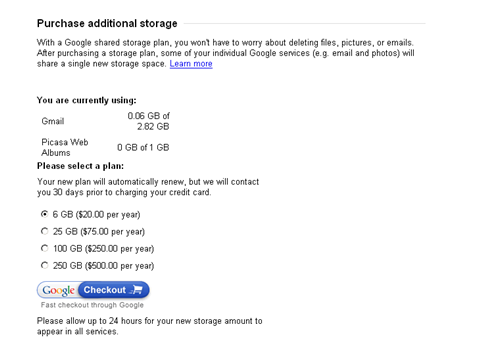Why would I pay Google for extra storage?

Google outlined plans to allow its customers to buy more storage if they run past their caps from posting photos or hoarding email. But why pay Google for storage when it's basically free elsewhere?
We've been continually told that storage costs are going down and Google rivals like Yahoo already do the "unlimited storage" dance.
Yet here comes Google doing us a favor. From the Official Google Blog:
"The Picasa team is pleased to tell you that in a few hours we'll be rolling out extra storage that you can purchase to use across several Google products (today, Picasa Web Albums and Gmail; soon, other applications like Google Docs & Spreadsheets). That will help make storage really useful, like letting you upload lots of full resolution images to Picasa Web Albums. When you reach the limit of free storage (i.e., 1GB for Picasa Web Albums, 2.8GB for Gmail), consider this your overflow solution. Plans start at $20/year for 6GB (yes, $5 cheaper than before), with larger plans ranging up to 250GB. If only testing everything were this easy."
Gee thanks. Then I get this as a page:
While this plan may be just peachy for hard core Google folks, those of us that use Gmail as a secondary account are left scratching our collective heads--especially if you use Yahoo.
At Yahoo I'm greeted with unlimited storage.
Flickr does have a pro account though for $24.95 a year. The free account gives you a bandwidth allowance of 100MB a month.
But the pro account at Flickr gives you unlimited storage.
Add this up and the Google pay for storage plan sounds like a rip-off to me--especially since Google is portraying this storage move as a great customer benefit.
Update: The more I chat about this Google storage strategy with folks the more confusing the move gets. I just can't figure out the benefit here--it'll be obvious if millions of people pay for storage.
But this move by Google totally bucks the recent trends. Google's move could mean:
- Storage isn't as cheap as we were led to believe. Perhaps storage costs are going up.
- Google is looking to squeeze more revenue due to a potential search slowdown (no evidence of this yet).
Other than that I just don't see the logic behind the move. As a customer I really don't see the value. For $500 I could forgo the Google storage and buy one of those snazzy Seagate drives. At that price I could also explore a service like Amazon's S3. The benefit to both the Amazon and Seagate solutions: I wouldn't be dependent on Google.
